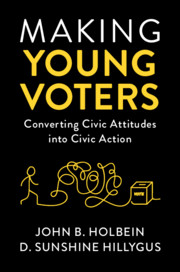28 results
A randomized experiment evaluating survey mode effects for video interviewing
-
- Journal:
- Political Science Research and Methods / Volume 11 / Issue 1 / January 2023
- Published online by Cambridge University Press:
- 01 August 2022, pp. 144-159
-
- Article
- Export citation
List of Tables
-
- Book:
- Making Young Voters
- Published online:
- 19 February 2020
- Print publication:
- 20 February 2020, pp xi-xii
-
- Chapter
- Export citation
6 - Promoting Follow-Through by Reducing the Cost of Voting
- from Part 2 - Public Policies and Youth Turnout
-
- Book:
- Making Young Voters
- Published online:
- 19 February 2020
- Print publication:
- 20 February 2020, pp 155-178
-
- Chapter
- Export citation
Part 2 - Public Policies and Youth Turnout
-
- Book:
- Making Young Voters
- Published online:
- 19 February 2020
- Print publication:
- 20 February 2020, pp 115-117
-
- Chapter
- Export citation
Contents
-
- Book:
- Making Young Voters
- Published online:
- 19 February 2020
- Print publication:
- 20 February 2020, pp v-viii
-
- Chapter
- Export citation
7 - Looking Ahead
- from Part 2 - Public Policies and Youth Turnout
-
- Book:
- Making Young Voters
- Published online:
- 19 February 2020
- Print publication:
- 20 February 2020, pp 179-189
-
- Chapter
- Export citation
Part 1 - Noncognitive Skills and Youth Turnout
-
- Book:
- Making Young Voters
- Published online:
- 19 February 2020
- Print publication:
- 20 February 2020, pp 23-24
-
- Chapter
- Export citation
2 - Rethinking What Makes Voters
- from Part 1 - Noncognitive Skills and Youth Turnout
-
- Book:
- Making Young Voters
- Published online:
- 19 February 2020
- Print publication:
- 20 February 2020, pp 25-45
-
- Chapter
- Export citation
4 - Evidence Noncognitive Skills Increase Voting
- from Part 1 - Noncognitive Skills and Youth Turnout
-
- Book:
- Making Young Voters
- Published online:
- 19 February 2020
- Print publication:
- 20 February 2020, pp 71-114
-
- Chapter
- Export citation
Index
-
- Book:
- Making Young Voters
- Published online:
- 19 February 2020
- Print publication:
- 20 February 2020, pp 251-266
-
- Chapter
- Export citation
Acknowledgements
-
- Book:
- Making Young Voters
- Published online:
- 19 February 2020
- Print publication:
- 20 February 2020, pp xiii-xvi
-
- Chapter
- Export citation
1 - The Puzzle of Low Youth Turnout
-
- Book:
- Making Young Voters
- Published online:
- 19 February 2020
- Print publication:
- 20 February 2020, pp 1-22
-
- Chapter
- Export citation
3 - What Are Noncognitive Skills?
- from Part 1 - Noncognitive Skills and Youth Turnout
-
- Book:
- Making Young Voters
- Published online:
- 19 February 2020
- Print publication:
- 20 February 2020, pp 46-70
-
- Chapter
- Export citation
Bibliography
-
- Book:
- Making Young Voters
- Published online:
- 19 February 2020
- Print publication:
- 20 February 2020, pp 229-250
-
- Chapter
- Export citation
List of Figures
-
- Book:
- Making Young Voters
- Published online:
- 19 February 2020
- Print publication:
- 20 February 2020, pp ix-x
-
- Chapter
- Export citation
5 - public policies and youth turnout
- from Part 2 - Public Policies and Youth Turnout
-
- Book:
- Making Young Voters
- Published online:
- 19 February 2020
- Print publication:
- 20 February 2020, pp 118-154
-
- Chapter
- Export citation
Frontmatter
-
- Book:
- Making Young Voters
- Published online:
- 19 February 2020
- Print publication:
- 20 February 2020, pp i-iv
-
- Chapter
- Export citation
Appendix
-
- Book:
- Making Young Voters
- Published online:
- 19 February 2020
- Print publication:
- 20 February 2020, pp 190-228
-
- Chapter
- Export citation

Making Young Voters
- Converting Civic Attitudes into Civic Action
-
- Published online:
- 19 February 2020
- Print publication:
- 20 February 2020
The Development of Students’ Engagement in School, Community and Democracy
-
- Journal:
- British Journal of Political Science / Volume 50 / Issue 4 / October 2020
- Published online by Cambridge University Press:
- 16 October 2018, pp. 1439-1457
- Print publication:
- October 2020
-
- Article
- Export citation



